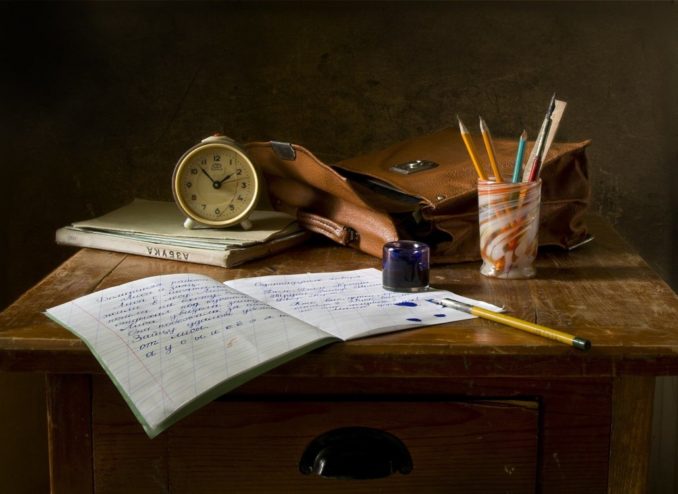
“Have a lovely evening” are the words I often heard as children were collected from school at 3.05pm. Of course, as a member of SLT, I had nothing better to do at the end of the school day, than stand on the drive smiling (behind the obligatory facemask) and waving to children and “their adults” (can’t say “parents” – need to be inclusive!) Even more grating, as we crawled through December to the end of the long Autumn term, were the words “Have a lovely rest – are you doing anything over Christmas?” I would have loved to have sat those “adults” down and walked them through the couple of weeks “holiday” that stretched out in front of me. But just pause a moment as I look back at what those adults may not realise teachers do, day in day out.
I went into teaching as a mature career changer but did I really know what I was getting into? I completed my PGCE with placements in schools in Tower Hamlets and Bromley. The quality of training depends totally on the teachers the student is placed with. In Tower Hamlets my class teacher had the communication and delegating abilities of a slug (no offence to slugs). I was an inconvenience to her. On the other hand, my Bromley teacher was a control freak who criticised every detail. I was paying £9,000 to complete a year of post graduate studies which were little more than making it up as you go along. But that’s a whole different story. Let’s get back to a day in the life of a teacher.
Walking into St Thingummy’s Primary School in September 2015 I had no idea what was lying ahead of me. Teachers talk of toxic environments and bullying leadership teams. That certainly wasn’t the situation at St Thingummy’s – it was very much an embracing school family and we had each other’s back however it was certainly the case that, if you did something wrong you were told about it but the positive things were rarely acknowledged. Oh, and if you did do something wrong, you weren’t told how to do it right next time. Make it up as you go along again.
So, on day one as an NQT with 30 pairs of 6 and 7 year old eyes staring at me expectantly (with at least 8 of those eyes belonging to children with Special Educational Needs and likely to cause havoc), I began my roller coaster career through four years of classroom teaching and two more of leadership and cover roles. I was prepared….wasn’t I….?
Let’s see?
Day one – a child was too nervous to ask to go to the toilet. She wet herself. Somehow we got the child sorted however, according to mother at home time, it was clearly my fault and couldn’t I have pre-empted it? Er – no – I think I was teaching at the time.
I took my class to a local museum. One of my “special” children decided to have a melt down because his iPad ran out of batteries so he flew down two flights of stairs and towards the exit at break neck speed. Thankfully one of my adult volunteers could run faster than he could and managed to intercept. We couldn’t send him back to school as this would mean we weren’t being inclusive – so instead, three members of SLT (the head, deputy, and SENCo) drove to the museum to spend the next two hours standing in their high heels in a sand pit overseeing behaviour. Again, it was my fault for not pre-empting the melt down. (I still have flashbacks of a lesson observation with that same child running up and down the back of my classroom waving an inflatable seagull around and squawking as he went!)
But let’s get back to that adult who thinks I will leave school shortly after them – probably around 3.30pm – and make my way home for a relax. Pahh! I’d regularly arrive at 6.30am and spend the next two hours setting up resources for my lessons. Photocopying and trimming pages of books for group reading, word banks of key words, question sheets, checklists, picture stimuli which were the hook for the lesson.
Lessons have to be planned with a clear learning objective, which is a sensible start, but it has to be differentiated three ways. First level, with lots of resources or support so that the “lower ability” at least have a vague hope of “accessing the learning” (aka getting it marked as correct – although in practice it’s with heavy adult help). Second level – what you really want the children to be able to do, and finally the “stretch objective” for the “more able” (i.e. children who were tutored endlessly which is a remarkable pain for a class teacher especially when the child turns to you with a bored expression and say “my tutor taught me how to do this and their way is better than yours”).
But we still can’t start the lesson – we have to have that engaging “hook” – something to get the children excited about their learning. With 25 lessons each week, this can be a remarkable pain and time consuming to resource. And so we start the lesson; but teacher talk has to be at a minimum – more than 15 minutes in an hour’s lesson and SLT start frowning. Because after all, research shows that the children learn from each other and there should be lots of time given over to “talk partners”. Sure – that’s going to work with a bunch of hormonal 11 year olds when you ask them to talk to their partner how to use a semi colon. If they had no idea before, they certainly won’t after talking to their equally clueless partner.
But eventually we end up with the lesson completed and onto the next one. As Primary teachers we are expected to teach across the curriculum – Maths, English, Spanish or French, History, Geography, Science, RE, PE, ICT, Art, Music, Reading…. I’ve probably missed something out. Over a day teachers can be teaching any five of those, resulting in five sets of 30 books to be marked. 150 books which need to be marked with the correct coloured pen and two highlighters. Oh the horror when an adult volunteer once ticked one of my children’s books in blue pen!!

Sure, there were tricks to avoid a pile of 150 books – perhaps we did a piece of “liturgical dance” instead of a written RE lesson to skip one set of marking, but I’m sure that “adult” who thinks I leave at 3.30pm would still be surprised to see the pile in front of me.
Did I mention compulsory morning playtime duty when we were expected to coordinate games and administer first aid? I’m sure a pathologist could detect a teacher at autopsy by the size of their bladder. Toilet breaks from 8.30am when the first child entered the class though to 12.15pm when they went to lunch didn’t exist.
Ahh, lunchtime – so we gathered in the staff room for a chat and gossip? Wrong, I would spend most of my lunchtimes in the lunch hall telling children to cut their food and not spear their potato with a fork and chew it like a savage. Then I’d be scraping food off trays – which meant I’d often go back into class with gravy and custard stains on my blouse because….well, why would we be given an apron?
You’d think the pressure would ease a bit at the end of the day but this was when the adults got to speak to us face to face and rip however many shreds off us that they wanted to. Often they questioned why we had reprimanded their child the day before. Of course I was in the wrong and darling little Johnny-who-can-do-no-wrong was clearly hard done by. Funny how children only tell their parent one side of the story and how the parents want other children reprimanded but never their own! Oh, and he had to log those conversations onto “the system” just in case the Head got involved later.
Children gone, we then had to phone parents to explain little Johnny had overheard the “sh**” word the playground today. Very sorry – won’t happen again (too right it will!) I do remember one lovely father who replied with “That’s OK Miss, he’s heard much worse than that at home!”
Did I mention staff meetings? Wednesday afternoon – an hour taken out of that precious marking time for some “essential” training – safeguarding, assessment, moderation etc. etc. In the big scheme of things, some of this was important but there was some rubbish we had to sit through! Still – back to my class at 4.30pm to start marking.
Oh, I forgot to mention the whole class assembly which has to be written, rehearsed and delivered to adoring “adults”. Again, the pitfalls…. Why did Bob get more to say than Mary? Why did you chose that song, when Year 4 wanted to use it for their assembly – you’ve ruined their plans now! Why didn’t you rehearse more so that the children were perfect (Because I was trying to teach 25 other lessons that week and the hall was being used every day for PE!) I won’t get started on Nativity Plays other than to say stress levels are unbelievable. What to do when Tree Number 3 has a crying fit and refuses to go on stage to deliver their line that they’ve practiced relentlessly – “I am a very beautiful tree indeed”. (Delivered by me, in the end, with scowls from Tree Number 3’s disappointed “adults”).
Did I mention, I still couldn’t start marking those books yet because I had to phone two parents to say their children bumped heads? School policy – any head bump needed a phone call home. Good old cold compress – does the trick again. Oh and the other call to Bob’s parents because he accidentally touched Bill on the bottom when he was putting his coat on! For goodness sake – hardly the end of the world but this could be the start of a safeguarding incident and so we needed to log the touching of the bottom and log the phone calls to Bob and Bill’s adults. Yes, really.

Maybe I could start on those books by this time of the day? No, I needed to register an off-site trip for the Head’s approval. She’s already approved it but it needs to be “on the system”. Oh and I would then have to write to adults, book the coach, work out the budget, tell Cook how many packed lunches we need, get the hi vis jackets counted out…..
Because that’s not enough, teachers are expected to be subject leaders. I was maths subject leader. I had to monitor lessons, talk to pupils – are they making progress, how do books compare across two classes – assess whether teachers are using appropriate resources. Then this report had to be photocopied, discussed with the head and then reported back to colleagues with a grading Ofsted-style and next steps for development. And I had to do this during my PPA time – assuming that was when they were teaching maths. Otherwise, I was stuffed!
Oh – next week will be UNICEF Week. Lessons have to be planned which reflect sustainable development goals and how my little 6 year olds are going to achieve them. More research and planning! The week after will be Deaf Awareness Week and then the next week will be National Maths Week. Perhaps I’ll be able to get back to those 25 subjects the week after?
Not done my marking yet.
Teachers get 10% PPA time each week out of class – Planning, Preparation and Assessment. Who ever thought that a weeks’ planning and resourcing and assessment of learning from last week’s 25 lessons can be completed in 2 and a ½ hours is a misguided fool who has never set foot in a classroom. So planning spills over to the weekend. As an NQT, I would spend most of Saturday and a good chunk of Sunday planning for the week ahead. Or using the half term week to try (try!) to get ahead of myself by planning a sequence of RE or Science lessons. What was it that “adult” said? “Have a lovely rest – are you doing anything over Christmas?” Pahh!
Those books? Well I’d mark what I could in school – in my NQT year I’d be the last one out at 7.30pm after an 11 hour day. Otherwise, I’d lug them home and mark with a fork in one hand and highlighter in the other (what did I saw to that child earlier today about not eating their food without cutting it into bite sized pieces?)
So that is just a tiny insight into the day of the teacher. I hope that the adult who wished me a lovely evening has some understanding of the uphill battle teachers are climbing, and never winning. I never did really get to see over the top of the mountain of things to do. So, as of yesterday 31st December, I have now left teaching and don’t intend to go back. In reality, the teaching bit is probably 30% of the job. The planning, the paperwork, the parents (sorry, adults), the special educational needs, the behaviour, the safeguarding – it’s too much to try and do properly so I’d rather not do it at all.
I don’t know where I’ll be in six months’ time. Certainly not in the classroom. Maybe a touch of tutoring, maybe some consultancy work. But not as a primary teacher, even with those lovely 9-3.30pm days and long, long summer holidays!
© Hamster Wheel 2022



